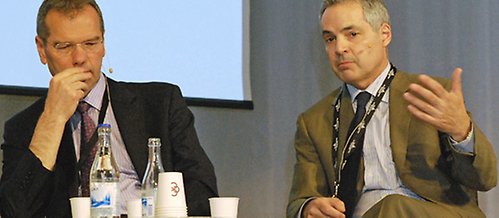- Start
- / Home
- / News from Brå
Stockholm Prize in Criminology presented to Laub and Sampson

John Laub and Robert Sampson, winners of the 2011 Stockholm Prize in Criminology.
About the prize winners
John H. Laub is the Director of the National Institute of Justice, the research arm of the United States Department of Justice. He is also a Distinguished University Professor of Criminology and Criminal Justice on leave from the University of Maryland. He has also served as a Visiting Scholar in the Institute for Quantitative Social Science at Harvard University and was the Editor of the Journal of Quantitative Criminology from 1991 to 1996. From 2002 to 2008, he was a member of the Committee on Law and Justice of the National Academies of Science.
Professor Laub served as President of the American Society of Criminology (2002- 2003) and he was awarded their highest research prize, the Edwin H. Sutherland Award, in 2005. With Robert J. Sampson, his two books each won three major awards: The Albert J. Reiss, Jr, Distinguished Book Award from the American Sociological Association's Crime, Law, and Deviance Section; the Outstanding Book Award from the Academy of Criminal Justice Sciences; and the Michael J. Hindelang Book Award from the American Society of Criminology.
Professor Laub has authored many research articles in the areas of crime and the life course, juvenile delinquency, juvenile justice, and the history of criminology.
Robert J. Sampson is the Henry Ford II Professor of the Social Sciences and former Chair of the Department of Sociology at Harvard University. Currently he is Visiting Scholar at the Russell Sage Foundation in New York City. The American Society of Criminology awarded Sampson the Edwin H. Sutherland Award in 2002, and elected him President in 2010.
Before being appointed at Harvard in 2003 he taught in the Department of Sociology at the University of Chicago and before that the University of Illinois at Urbana-Champaign. Sampson´s other prior appointments include Senior Research Fellow at the American Bar Foundation and Fellow at the Center for Advanced Study in the Behavioral Sciences. He was elected a permanent Fellow of the American Academy of Arts and Sciences in 2005, Ernest Burgess Fellow of the American Academy of Political and Social Science in 2006, and a member of the National Academy of Sciences in 2006.
Professor Sampson has published widely in the areas of crime, the life course, neighborhood effects, social inequality, civic engagement, and the social organization of cities. He recently completed a book based on fifteen years of research from the Project on Human Development in Chicago Neighborhoods.
About the prize
The Stockholm Prize in Criminology was instituted in 2005 in order to recognize outstanding achievements in the field of criminological research or in the application of research findings by practitioners. The Prize is financed by foundations in USA, Sweden and Japan. The principal donor is the Jerry Lee Foundation, USA.
Substantial donations are also made by Söderbergs Foundations, Sweden. The Prize winners have been selected by an independent jury comprised of criminologists from Asia, Latin America, North America, Africa, Australia and Europe. The Jury is chaired by Professor Jerzy Sarnecki of the University of Stockholm and Professor Lawrence Sherman of the University of Cambridge.
Fakta
- 9 000 anmälda fall av misshandel mot barn 7—14 år
- 2 500 anmälda fall av misshandel mot barn 0—6 år

